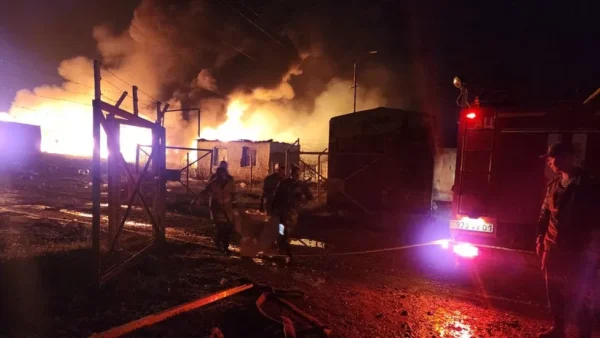In a grim incident in Azerbaijan’s disputed Nagorno-Karabakh region, a massive explosion at a fuel storage facility resulted in the death of 20 individuals, with hundreds sustaining injuries, local Armenian officials reported.
Hospitals have admitted close to 300 people, of whom a significant number remain in a “critical state”. This disaster coincided with an announcement from the Armenian government revealing that 13,350 refugees had migrated into Armenia from the contested enclave.
Nagorno-Karabakh, a contentious region, predominantly houses around 120,000 ethnic Armenians. The precise reasons for Monday evening’s explosion in Stepanakert, the region’s principal city, are yet to be ascertained.
Gegham Stepanyan, the Human Rights Ombudsman, shared on social media platforms, “Post the explosion in the fuel depot, the count of injured is above 200. The majority are in a severe or extremely critical condition, stretching the medical resources of Nagorno-Karabakh beyond its limits.” As per a Tuesday statement, officials confirmed the discovery of 13 unidentified victims at the site of the explosion, while seven succumbed to their injuries in medical facilities.
Following Azerbaijan’s recent occupation of Nagorno-Karabakh, an exodus from the region was witnessed, spurred by the Armenian government’s plans to relocate individuals displaced due to the conflict.
Armenia’s PM, Nikol Pashinyan, has expressed concerns over an ongoing “ethnic cleansing” in the region. While interacting with journalists, Pashinyan commented on the urgency with which the international community should have acted. In contrast, Azerbaijan has communicated its intention to integrate ethnic Armenians as “equal citizens”.
BBC correspondents spoke with refugees in Goris, Armenia, near the Karabakh border. One man emotionally recounted his life’s dedication to his homeland, adding, “It would have been preferable to face death than this.” Veronica, another refugee, shared that this marks her second displacement, the first being during the 2020 conflict.
European Union-supported discussions between Armenian and Azerbaijani envoys are slated for Tuesday in Brussels. This would be their maiden diplomatic dialogue post Azerbaijan’s occupation of the enclave last week, represented by their national security advisors.
Though internationally recognized as Azerbaijani territory, Nagorno-Karabakh has been under ethnic Armenian control for around 30 years. This region has been buoyed by not just Armenia but also their ally, Russia, which has stationed troops there for several years. Last week, as Azerbaijan’s forces advanced, five Russian peacekeepers, along with many ethnic Armenians and Azerbaijani troops, lost their lives.
Concerns loom for Nagorno-Karabakh’s residents, despite Azerbaijan’s reassurances. Reports indicate that since the ceasefire agreement, only a single 70-tonne food aid delivery has been allowed, leaving thousands devoid of basic necessities. Ethnic Armenian leadership reveals the dire conditions of many, taking refuge in basements, educational institutions, or even outdoors.



























